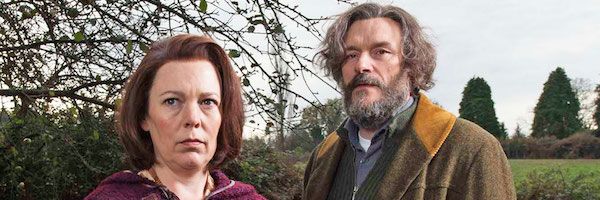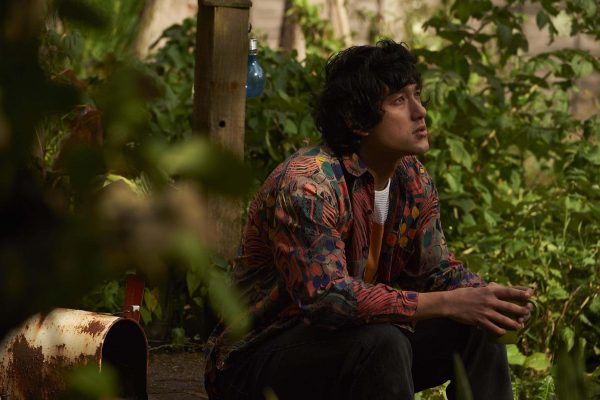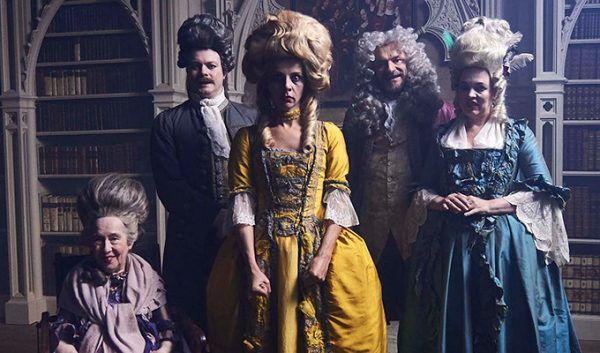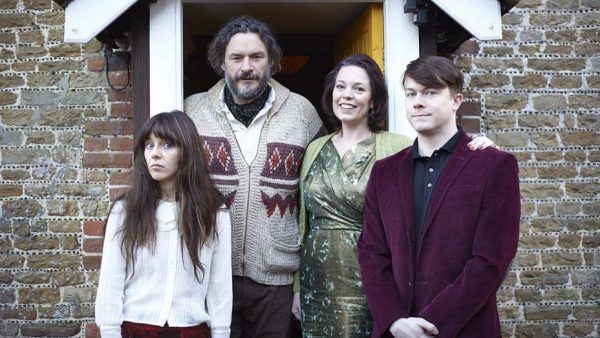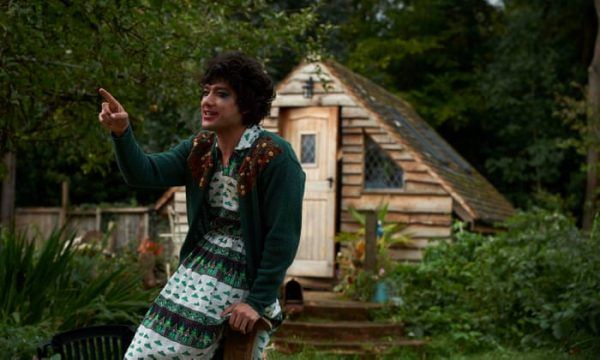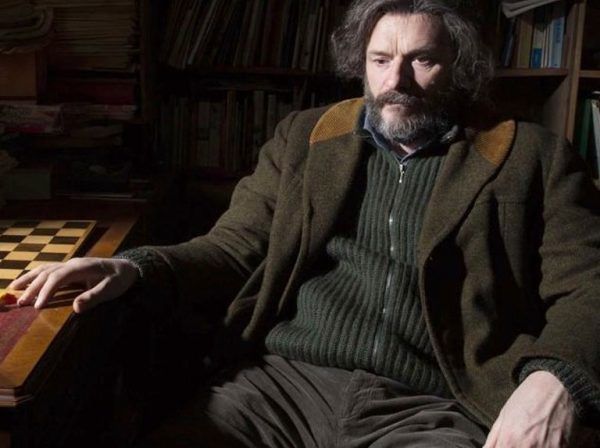A dark, quirky British comedy whose cast is led by The Mighty Boosh’s Julian Barrett and Oscar-winner Olivia Colman? You need not twist my arm! But Flowers is not a show that is immediately easy to like, but is a reward for those who stick with it. It initially has the trappings of a classic black comedy — the opening scene is of Barrett’s children’s book author Maurice trying to hang himself and the branch breaking to save him— but as it continues it reveals itself more as a closed-in emotional horror. It is also a series that intensely depicts ongoing struggles with mental illness.
The off-putting Channel 4 series, which runs for 2 seasons of 12 half-hour episodes on Netflix in the U.S., focuses on the Flowers family. There’s the aforementioned author Maurice, who created a dark, Edward Gorey-esque book series called Grubbs, and who is experiencing a major depressive episode. His upbeat wife, Deborah (Colman) can’t understand why her family is constantly going off the rails, and she flirts with local builders trying to win back some of the attention her gloomy husband no longer provides. The couple have 25-year-old twins who live at home with them: tinkerer and failed inventor Donald (Daniel Rigby), and Amy (Sophia Di Martino), a reclusive goth musician. The setup is already one full of cartoonish personalities, which then brings us to Shun, an extreme caricature of a Japanese illustrator that feels uncomfortably racist.
And yet, Shun is played by the series’ writer, director, and creator, Will Sharpe. There’s then a question about whether Sharpe is purposefully leaning in to stereotypes in order to subvert them, or if the humor is just meant to be wildly off-color. As Flowers continues, it begins to matter less and less. The characters are large, their bust-ups are always massively dissonant, but underneath the noise Flowers hits on some intense truths. In the first season, Barrett is extraordinary as a man who is desperately sad, yet comes to his own terms that there is no changing it. Deborah doesn’t accept this, even though there are moments where she really tries. Maurice can’t articulate what he feels or why, and flatly though sincerely tells Deborah he loves her without knowing anymore how to show her. She’s frustrated and he’s embarassed, and there is a particularly intense subplot regarding a neighbor whose wife committed suicide years before by cutting herself open. “I carry this knife around to remind me,” he says, brandishing it at Maurice. “Of how hard it was.” He misses his wife, and yet, life with her was chaotic and difficult. When Maurice’s depression is brought to light, it’s mostly tough love, with him being told he’s a selfish twat and cripplingly boring. He doesn’t disagree, but it also helplessly enrages him.
Maurice is not the only one of the Flowers who struggles — they’re all struggling in their own ways. In the first season, there are occasional gothic sequences where we see Amy’s vision of the world around her. It’s spooky and full of ties to an ancient people she feels connected to which inspires her music, but adds another dimension when she falls in love with the beautiful Abigail (Georgina Campbell). But Amy’s fights with her brother Donald, who also loves Abigail (Abigail, it should be noted, prefers Amy), are examples of the violent shifts in tone the series goes through, not all of which work. But it takes admirably bold swings as it vacillates wildly from a quirky comedy full of unusual characters to a deeply strange and rather haunting portrait of a family exhausted from emotional turmoil. They scream at each other but love each other. Amy bullies Donald, and in response he’s mean, petty, and arrogant. But when she needs him, he is always there to help. He yells at her that he cares about her and that she’s a bitch.
In the second season, Maurice is facing his demons with professional help, and the focus changes to Amy. She appears to be thriving, but her growing obsession with her lineage and a frightening, mysterious “Baumgarten” book that belonged to her deceased magician grandfather overtakes her life. The music she creates as part of this inspiration is harsh, scary, and a whirlwind of dark emotions. There is a clear thread of “madness” throughout the family that unites the season in a new and stronger theme, one that moves from Maurice’s depressive episode to Amy’s racing mania. The visceral nature of her visions — through the chaotic, obsessive reinforcement of conjured scenes in her mind — cannot be overstated. Sharpe, who is himself Type 2 Bipolar, worked with an organization called Mind to make sure his depiction was accurate. A true auteur with a unique vision, it is exactly Sharpe’s woozy artistry and gut-wrenching illustrations of an out-of-control mind that make Flowers such an absorbingly uncomfortable watch. It’s not meant to encapsulate every experience, but it investigates difficult emotions from a variety of sources in ways that make them recognizable, if extreme examples, of personal trials.
However, Season 2 is also when Sharpe begins to focus more on Shun, and the fallout of a revelation he makes about his life in Japan. The story he tells here, which is lifted out of exceptional darkness with muted, well-placed humor, completely changes the shading of his character. As the series continues, Shun becomes increasingly unhinged and forgotten, a devastating combination that leads to an uncertain ending. The show’s final episode, which is both an epilogue or sorts as well as a prologue to when Shun first met the Flowers, also reveals something vital about them all. It closes with illustrations Shun has done of the family battling a never-ending host of demons, the shadows that seem to follow all of them constantly, trying to undermine any happiness they seek for themselves. Shun quietly and with tears in his eyes says to Maurice, “The difference between life and death … so small. But if you can hold …”
Maurice nods and smiles, knowingly. Hold on to life with everything you have.
Flowers is currently available on Netflix.

